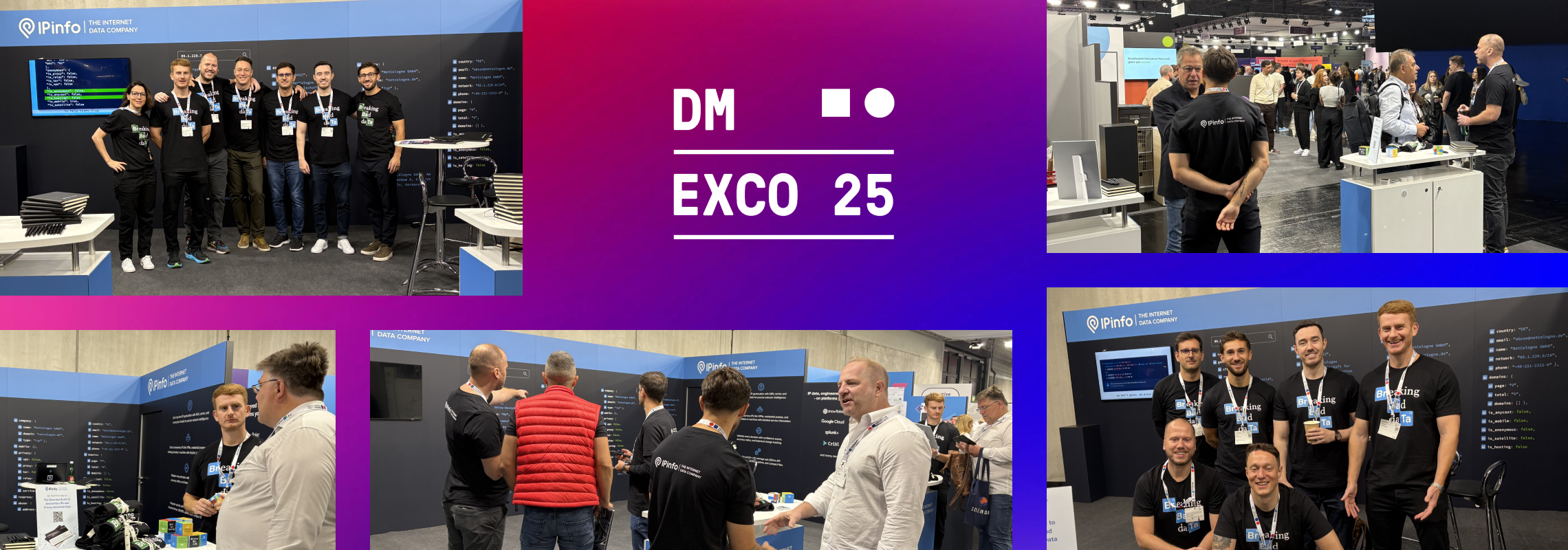DMEXCO 2025 Wrap-Up: Why AdTech Is Ready for Better IP Data

With over 40,000 attendees from 100+ countries converging in Cologne this week, DMEXCO 2025 delivered a clear message: the AdTech ecosystem is done with "good enough" data. DMEXCO (Digital Marketing Exposition & Conference) is one of Europe’s biggest annual trade‐shows and conferences in the digital marketing and tech space. Attendees include marketing, media, and tech professionals, including brands, agencies, publishers, ad tech, innovation players.
We went to see what’s new and what’s next in digital marketing, advertising, and media tech. Our conversations at IPinfo's booth revealed an industry grappling with the same fundamental challenge: how to balance accurate signals with operational realities in an increasingly complex digital landscape.
The State of AdTech: Key Themes from the Show Floor
The Cookie Crumbles, Context Rises
The death of third-party cookies dominated discussions, but the focus has shifted from panic to pragmatism. Publishers and advertisers are moving beyond lamenting what's lost to building what's next: first-party data strategies, contextual targeting, and IP-based intelligence. For programmatic advertising, a major focus at DMEXCO, this shift is critical. Buyers need reliable, privacy-compliant signals to maintain targeting precision and campaign performance without cookies.
CTV's Growing Pains
Connected TV was one of DMEXCO's spotlight topics, with dedicated stages for addressable TV and measurement. But success in CTV requires solving a critical infrastructure gap: IPv6 coverage. As CTV traffic increasingly runs on IPv6, incomplete IP data leaves advertisers unable to properly target, verify, or measure their campaigns.
The Consensus Trap
Here's what nobody says out loud but everyone knows: the industry often chooses consistent data over correct data. When tracking platforms disagree on geolocation, even when one is demonstrably more accurate, most players default to whatever their partners use to avoid reconciliation disputes. It's a rational choice that leads to an irrational outcome: everyone using the same imperfect data.
Beyond the AI Hype
While AI buzzwords were everywhere, the real conversations focused on practical applications: automating bid optimization, improving fraud detection, and scaling contextual analysis. The winners aren't those with the flashiest AI claims, but those solving real operational problems.
What AdTech Actually Needs: Insights from Our Booth
The pain points we heard weren't theoretical. They were urgent, specific, and costly:
- Junk traffic eating budgets: Teams need residential proxy detection and hosting identification that actually works
- CTV blind spots: IPv6 gaps mean missing 30-40% of traffic in some campaigns
- Point of Interest (POI) detection: Our newly launched IP tags for hotels, airports, and even in-flight connectivity generated significant interest enabling hyper-contextual targeting
- Sophisticated fraud: Multi-account voucher abuse and campaign leakage require granular signals
What struck us most was how ready the market is for solutions. These aren't nice-to-haves anymore, they're must-haves.
Looking Forward: Deeper Dives Coming Soon
The conversations at DMEXCO deserve more than surface-level discussion. In the coming weeks, we'll explore the critical themes that kept surfacing: the accuracy versus consensus debate in IP geolocation, how precise IP intelligence directly impacts fraud prevention and campaign performance, why IPv6 coverage is becoming a competitive differentiator in CTV and emerging markets, and how Point of Interest data is opening new frontiers for contextual targeting in travel, hospitality, and retail.
The Bottom Line
DMEXCO 2025 confirmed what we've been seeing all year: IP data quality has moved from the technical margins to the business center. When every impression counts and every fraudulent click costs, reliable IP intelligence directly impacts the bottom line.
We left Cologne energized by the quality of conversations and the genuine curiosity about what IP data can deliver. The industry isn't just ready for better IP data. It's demanding it. Because in AdTech, the difference between good enough and genuinely good is the difference between profit and loss.
About the author

As the product marketing manager, Fernanda helps customers better understand how IPinfo products can serve their needs.